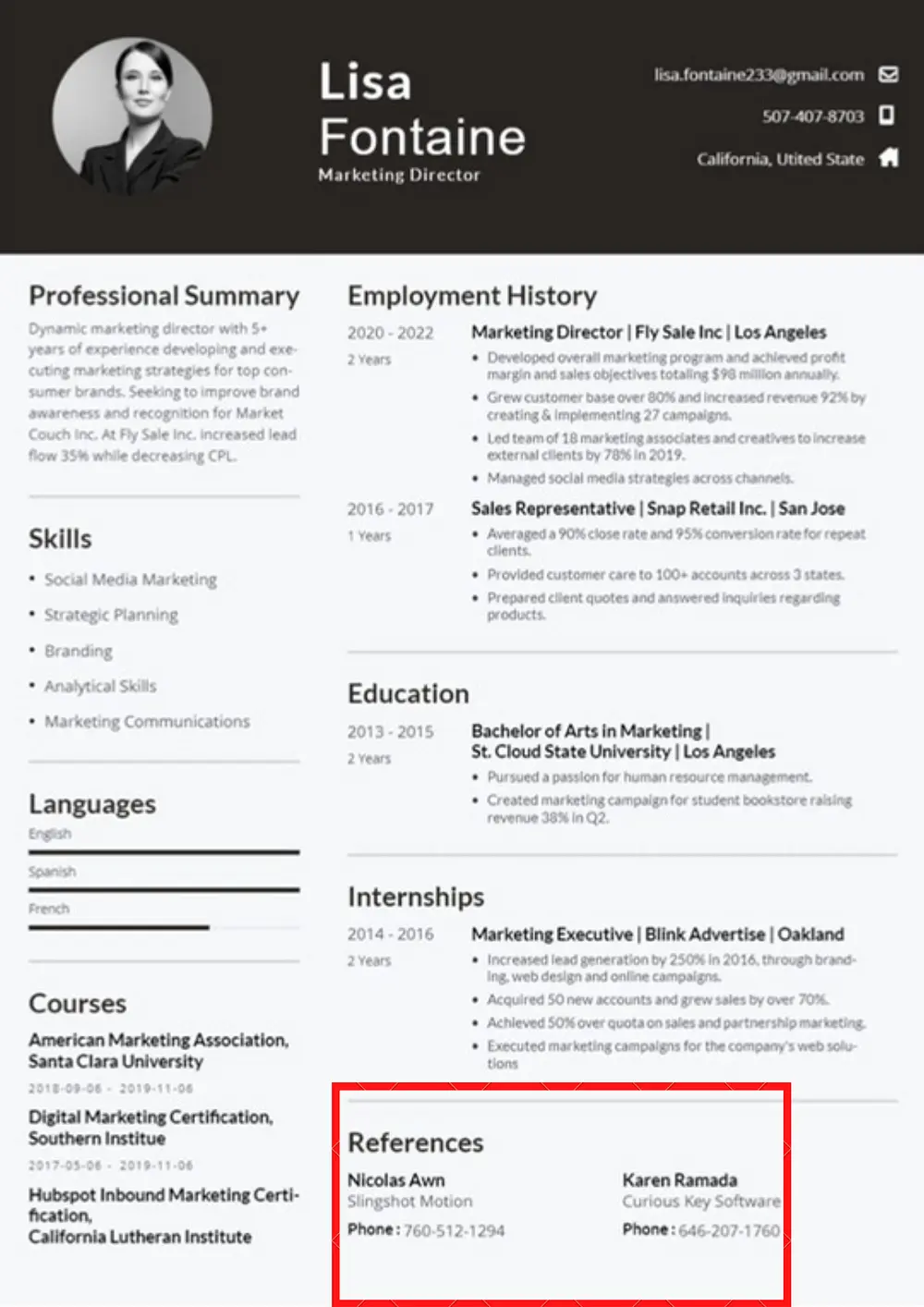Adding References on Resume

Adding References on Resume
Picture this: You've just nailed your job application, your resume is a work of art. But wait, there's a twist in the tale, HR asked you for a list of your references — the references. Ah, those elusive guardians at the gates of your dream job.
References are the unsung heroes of the job application saga. They are something that tells your character/experiences when you are not in the room.
Imagine your chances of hiring is 50 percent. There comes a glorious reference that could increase your chances of hiring by 10 percent. So beware, always provide references that you believe can increase your goodwill in front of the hiring manager.
So, as we dive into the understanding of how to make these references work best for you and how to format them in such a way that it will increase your chances of shortlisting.
Remember: these are not just names on paper. They're your personal cheerleaders, your bridge to that next big leap. Let's make sure they turn out to be positive for you.
Table of Contents
- Should I Include References on my Resume?
- How to Format References on a Resume?
- Who to Choose as References?
- How Many References You Should Have?
- Common Mistakes to Avoid
- Conclusion
Should I Include References on my Resume?
This question comes in everybody's mind. Should I really include references in my resume? The answer is BIG NO. Let's understand why.
So, here's the deal: stuffing your resume with references is kind of like wearing socks with sandals. Sure, you can do it, but just because you can, doesn't mean you should. Your resume is this precious little space where you get to show off what you're all about — your skills, your achievements, and why you're the best thing. It's not really the place for a list of folks who agree you're awesome.
But there is a good time to add references in your resume:
When you're deep into the interview process and things are looking good, that's your moment. When they ask, “So, got any references?” That's when you slide that list across the table and say, “Absolutely.” It's all about timing. Plus, this approach gives you a chance to give your references a heads-up that they might be getting a call, which is just good manners.
So, keep that resume focused on selling yourself. Let it shine, let it sparkle, and when the time is right, those references will be your mic drop. Keeping it cool, calm, and collected is the way to go.
How to Format References on a Resume?
Placement of References
Your references should be presented on a separate sheet rather than within the main body of your resume. This approach not only maintains the focus of your resume but also allows you to manage your references more flexibly, providing them only when requested by an employer.
Consistency in Design
To ensure a professional appearance across all your job application documents, maintain the same design elements: including font type, margin widths, and color schemes — on your reference page as used in your resume. This consistency aids in branding yourself and makes your entire application package look polished and well-thought-out.
Formatting Your Reference List
Begin your reference sheet with your personal contact information, aligning it with the styling choice (left, right, or center alignment) used in your resume and for uniformity.
The recommended order of details is:
- Name
- Job Position
- Company Name
- Company Address
Designate this section with a heading such as “References” or “Professional References” depending on the nature of your references.

References on Resume Example Resume Template
Avoid the dated practice of stating “References available upon request” on your resume. Employers formerly know this and it's an overworked phrase. Keeping your resume concise and focused on your qualifications and achievements is more beneficial and respects the reader's time.
By adhering to these guidelines, your reference list will not only complement your resume and cover letter but also enhance your overall candidacy by presenting your professional contacts in an organized and accessible manner.
Should I Include References on my Resume?
Selecting the right references for your job application is a crucial step that can significantly influence an employer's perception of you. Your references act as personal advocates who can attest to your abilities, work ethic, and character. Here are key criteria and tips to consider when choosing and asking for references.
Criteria for Selecting References
Professional Relevance: Choose individuals who are familiar with your work within the context relevant to the job you're applying for. Ideally, these should be people you've directly reported to or worked closely with, such as former supervisors, managers, or colleagues. They should be able to speak confidently about your skills, achievements, and work habits.
Prefer Recent Employers: Prioritize references from your most recent employment to provide a current perspective on your abilities and performance. This helps employers get the most accurate and up-to-date understanding of how you operate in a professional setting.
Diversity: Including a mix of references from different roles and capacities can offer a well-rounded view of your capabilities. For instance, combining professional references with academic (if you're a recent graduate) or volunteer supervisors can showcase your versatility.
Position and Credibility: Whenever possible, include references who hold or have held significant positions within their organizations. Their titles and standing can lend weight to their endorsements.
Importance of Choosing People Who Know Your Work and Character Well
Your references should be individuals who not only have observed your professional performance but also understand your work ethic and character. This insight allows them to provide specific examples of your strengths and achievements, making their recommendations more impactful and believable. Personal anecdotes where your skills or character traits shone through can make a strong impression on potential employers.
Tips on Asking for Permission to List Someone as a Reference
Ask Personally: Whenever possible, ask for permission to list someone as a reference in person or over the phone. This approach is more personal and respectful.
Provide Context: Explain the role you're applying for and why you think they would be an appropriate reference. Offering context helps your reference tailor their recommendation to fit the position.
Offer Information: Provide your reference with a copy of your current resume and details about the job you're seeking. This information can help them recall specifics about your work together and formulate a more compelling endorsement.
Express Gratitude: Regardless of whether they agree to be your reference, thank them for considering your request. Showing appreciation is crucial for maintaining a positive relationship.
Keep Them Informed: Once someone has agreed to be your reference, keep them updated on your job search progress. Let them know when they might be contacted by potential employers. This courtesy allows them to prepare and ensures they are not caught off guard by an inquiry.
Choosing the right references and asking them in a thoughtful, respectful manner can significantly enhance your job application. By carefully selecting individuals who can provide strong, relevant endorsements, you increase your chances of making a positive impression on potential employers.
How Many References You Should Have?
For Freshers
As a fresher, your professional network might be limited. Typically, having three to four references is advisable for someone at the beginning of their career. The key is to choose individuals who can speak confidently about your abilities, work ethic, and potential.
For Experienced Professionals
For those with more work experience, four to six professional references are recommended. At this stage, your references should primarily be previous managers, supervisors, or colleagues who can provide detailed insights into your professional achievements, skills, and character as they relate to the workplace.
Quality vs. Quantity of References
While having a list of references is important, the quality of each reference is far more critical than the sheer number. A few high-quality references who can offer specific examples of your accomplishments and character will always outweigh a longer list of contacts with less meaningful connections to you.
Focus on Relevance and Depth
- Relevance: Choose references who are relevant to the role you're applying for. Someone who can attest to your skills and experiences that directly align with the job requirements will be more impactful.
- Depth: It's better to list references who can discuss your strengths and weaknesses in detail rather than someone with a notable title but only a superficial relationship with you.
Preparing Your References
To ensure your references can provide the best possible recommendation:
- Inform them about the job you're applying for and why you've chosen them as a reference.
- Provide them with an updated resume and any relevant accomplishments or projects you'd like them to mention.
- Discuss any particular qualities or experiences you'd like them to highlight based on the job description.
Common Mistakes to Avoid
- One critical mistake job seekers often make is listing individuals as references without obtaining their explicit permission. This oversight can lead to awkward situations, especially if the reference is caught off guard by a potential employer's call. Always ensure you have consent from your references, and they are prepared to speak positively on your behalf.
- Another common error is including family members or close friends as professional references. While they may indeed vouch for your character, their bias is evident, and employers are looking for objective assessments of your professional abilities. Stick to colleagues, supervisors, or mentors who can provide a clear, unbiased view of your work ethic and accomplishments.
- Lastly, failing to keep your references informed about your job search progress can be a misstep. References should be aware of when they might be contacted so they can prepare relevant anecdotes and endorsements. Regular updates also demonstrate your respect for their time and contribution to your career advancement, helping to maintain strong, supportive professional relationships.
Conclusion
In conclusion, whether or not to put references on your resume depends on the job you're applying for. Sometimes, it's better to have a separate list ready to go when asked. This list should look neat and professional, just like your resume.
Choosing who to put on your reference list is key. Pick people who really know how good you are at your job and who you are as a person. You don't need a lot of people; three to five great references are enough. Make sure these are people who can speak highly of your work and character.
Finally, don't forget to ask your references if it's okay to use their names, and make sure they're not your family or close friends. Keep your references updated about your job hunt. These steps might seem small, but they're important in making a good impression of where you want to work.

